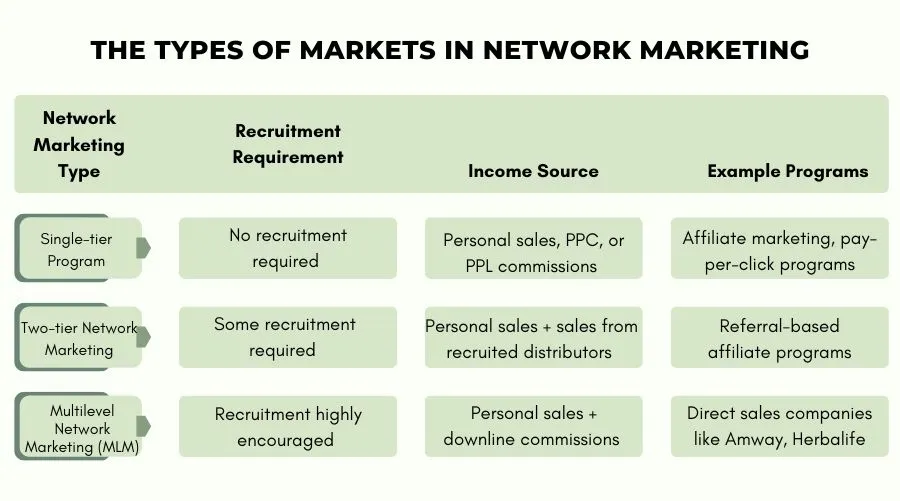Network marketing is a powerful business model that helps companies boost sales and allows individuals to build their own income streams, not just from their own sales but also from the performance of their team.
But with so much controversy and so many misconceptions, what exactly is network marketing, and is it a legitimate business?
Let’s dive deep with Thimpress to find out everything you need to know.
Eduma – Education WordPress Theme
We provide an amazing WordPress theme with fast and responsive designs. Let’s find out!
Quick Answer: What is Network Marketing?
Network marketing, also known as multi-level marketing (MLM) or direct selling, is a business strategy where companies sell products or services through a network of independent distributors. These distributors earn income in two primary ways: from their direct sales to customers and from a percentage of the sales made by the people they recruit into their team (known as their “downline”).

Understanding what network marketing is is the first step.
Understanding Network Marketing: The Core Concepts
Understanding the core of network marketing is the first step. It’s a business model developed to optimize sales efficiency.
In essence, it’s a tiered business structure where independent individuals handle the buying, selling, distributing, and advertising of products or services. They can be both customers and distribution partners for the company. The three key strategies used in this model are lead generation, recruiting, and management.
For example: You start as a buyer of Company A’s products and see great business potential. You decide to become a distributor, promoting the product and inviting others to buy. You also convince some customers to become your “downline” distribution partners. They, in turn, continue to promote and recruit others. This creates a multi-layered network, and participants earn income from their own sales and commissions from their downline’s sales.
This model often sparks debate. Some see it as a fantastic low-risk business opportunity for those with little capital, while others, who don’t fully understand it, may be taken advantage of by fraudulent schemes. That’s why many countries have introduced regulations to control network marketing and protect participants.
What is the History of the Network Marketing Industry?
After understanding what network marketing is, you should also learn about the history of this model. Network marketing was born in the 40s of the 20th century in the US and went through many different stages of development, which can be divided into 4 stages:
From 1945 to 1979
This is considered the germination stage of network marketing. At this stage, it has not been officially recognized. There are quite a few companies doing business with this form with unreasonable regulations. However, legislators do not care, and there are no documents regulating it.
From 1980 to 1989
At this stage, people have defined what network marketing is, it also began to be supported by the government. There are more companies that decide to choose this model for business. However, the obstacle is that it is not yet popular with the public because it is quite new.
From 1990 to 1999
This is considered the development stage of the network marketing model. At this stage, the network marketing model is widely popularized to the people, officially becoming a real business model and being responded to by many people.
From 1999 to present
Starting from 1999 until today, what is network marketing is widely known, the network marketing model has developed strongly and spread globally. It appears in many different countries.
Characteristics of Network Marketing

Network marketing is a business model built around direct selling and relationship-based promotion
In this section, we will learn in-depth about the characteristics of network marketing. This model has the typical characteristics that you need to know including:
- This model is a low-cost marketing method with the purpose of increasing the retail sale of goods and services. It is really effective in consuming products. For instance, distributors can use ad server technology to manage and deliver targeted digital ads on their websites or platforms, further amplifying their promotional efforts at a low cost.
- Network marketing is operated and implemented by building and utilizing a network of participants at many different levels. Each participant is a distributor and can also be a consumer.
- Not necessarily having a fixed sales point is also a prominent feature of network marketing. Sales can take place directly at the place of residence, workplace, or any location suitable for sales.
- Network marketing participants aim to diversify income sources. In fact, participants have many ways to earn income, such as bonuses, commissions, or many other benefits from their sales, as well as their “subordinates.”
Network marketing is an effective sales method. It helps businesses consume products without spending too much money investing in things like distribution channels or sales staff. Companies doing business in this form of network marketing can be the units that directly produce products for sale, but they can also be organizations that redistribute products from other manufacturers.
What is the Role of Network Marketing?

Network marketing bridges direct selling with interpersonal relationships.
It is an undeniable fact that network marketing has existed and developed for many years, which proves the role and benefits it brings to businesses that apply this model. So what are the roles and benefits of network marketing, let’s find out together.
The first thing to mention is the savings ability of this model. The network marketing model helps companies save maximum advertising costs when they have successfully built a network. In addition, companies that apply the network marketing model can also save costs such as transportation, rental space, etc.
In addition, because there is a direct distribution network to users, the products are more reliable. This is obvious when the people who introduce the product to you can be your acquaintances.
Network marketing is also considered a solution to help customers buy products directly from manufacturers, minimizing the situation of buying fake or poor-quality goods.
Finally, it is a method to increase retail sales in an amazing way. This is beneficial for businesses when they can earn huge profits.
How does Network Marketing Work?
When choosing a form of network marketing, it is very important to understand how it works.
Basically, we can understand that it operates on a hierarchical network model, in which participants can earn money from selling the company’s products or services and building their own network of downline distributors.
Specifically, companies following the network marketing model will create sales ranks. Those who join the network will be encouraged to recruit their own network.
Based on this model, those who create their own network (upline) can earn money on their own sales and on the sales of those in the network they create (downline). So on, the lower levels continuously grow, contributing commissions to higher levels.
Thus, the income of those participating in network marketing will depend not only on selling products but also on recruiting more members. Those who come first will have an advantage in terms of commission benefits.
What are the Types of Markets in Network Marketing?

We have three types of market in Network Marketing
Network marketing operates through different business structures. Here are some of the most popular types:
Single-tier Program
The first form that you need to know when learning what network marketing is a Single-tier Program, also known as one-level network marketing. This is a form that you can join and do not need to recruit new people in your network. Your revenue will depend entirely on your sales.
There are affiliate programs that are willing to pay you to be able to drive traffic to their channels. Single-tier Network Marketing also includes pay-per-click (PPC) or pay-per-lead (PPL) affiliate programs.
Two-tier Network Marketing
The two-tier Network is a little different from the above in that it will require some recruitment, but it is not entirely dependent on it.
Your income is still based on your direct sales (or the traffic to your website that you generate). In addition, you will have additional direct sales or referral traffic generated by the distributors you choose to work with.
Multilevel Network Marketing
Some direct sales organizations use multilevel marketing to encourage existing distributors to recruit new distributors in exchange for a portion of their sales. The recruited people are the distributor’s “downline.” Distributors also make a profit by selling products directly to customers.
Forms of Network Marketing
Network marketing comes in several forms. Each has its unique structure and earning potential. Here are the main forms:
Classification by Scope of Implementation
Based on the scope of territory and geography, network marketing can be divided into two types:
- Network marketing within the country is a form of network business only within the territory of a country. That is, the participants in the multi-level sales system live in the same country.
- Network marketing within the international scope: the multi-level network is developed in many different countries. Goods will be offered and distributed in many territories.
Classification by Nature
This is an important part to support you answer the questions raised at the beginning of the blog. We should not equate legal network marketing with illegal network marketing. Businesses also need to pay attention to this to avoid the law “visiting them”!
- Disguised network marketing is a form of multi-level marketing aimed at illegal profit. What is illegal? These are multi-level networks that require people who want to participate as “subordinates” to pay for a product even if they do not want to buy it or have to deposit and pay to join the multi-level network. In addition, illegal network marketing also provides false information about the nature of the work as well as the quality of products/services to convince customers to buy products and join the network.
- Genuine network marketing is a form of multi-level marketing that complies with the law and does not profit through illegal multi-level marketing activities.
A Few Notes When Choosing Network Marketing

It’s important to consider several key factors when choosing a network marketing
Not everyone is patient enough to learn about network marketing, leading to many failures when applying this business method. Here are some important notes when choosing Network Marketing:
Don’t Hang Around with Existing Relationships
In reality, you should not market to family or friends around you because this is an outdated way of doing things, unintentionally causing many people to have a wrong concept about network marketing. Instead, you need to reach out to wider relationships outside to find potential seeds.
Develop Relationships Instead of Taking Advantage
Most people think that Network Marketing is just taking advantage of relationships. However, this is only true for those who do Network Marketing without expertise or without a long-term vision. They will only want to exploit existing relationships to gain benefits for themselves.
In order to find real talents, Network Marketers are encouraged to operate more professionally. They need to develop to become real sales and recruitment experts, not just struggling with familiar relationships. Therefore, Network Marketers need to develop relationships over time, long enough to be able to recognize who has potential.
Don’t Miss Out on Potential Seeds
You must always be mentally prepared so that the “seeds” you are holding can slip away from your grasp at any time. They can move on to other networks or businesses if they are not respected or recognized for their abilities. Time will help you learn to see people accurately, so don’t hesitate when you discover any potential individuals in your sights.
Create a List of Loyal Individuals
In addition, you should also list the new individuals you find. While explaining to them about the working model and the commission policy, observe carefully their attitude. Remember that people want to be helped, not taken advantage of. Develop a relationship based on mutual support. That is the most basic step to build loyal individuals for you.
So, what is the warning for those who want to participate in the Network Marketing model? You need to avoid profiting by forcing people who want to join the network to pay money or buy products they do not want. If you do not comply, you will face legal punishment!
Network Marketing vs. Pyramid Schemes: The Critical Difference
A common misconception is that all network marketing is a pyramid scheme. This is a critical distinction to understand.
Network marketing is a legitimate business model focused on selling actual products or services. Pyramid schemes are illegal fraudulent operations that primarily make money from recruiting new members, not from selling products.
| Feature | Legitimate Network Marketing (MLM) | Illegal Pyramid Scheme |
| Primary Focus | Selling a real, valuable product or service. | Recruiting new members to make money. |
| Source of Income | Earn commissions on product sales + commissions from downline sales. | Earn commissions almost exclusively on recruitment fees. |
| Product | Real, high-quality, and reasonably priced. | No product, or a low-value “product” sold at an inflated price. |
| Legality | Legal and regulated in most countries. | Illegal and heavily prosecuted. |
Always be cautious of schemes that require large upfront payments, promise impossibly high returns, or focus on recruitment over product sales.
Chào bạn, tôi đã hiểu yêu cầu của bạn. Dựa trên các gợi ý đã phân tích, tôi sẽ chỉnh sửa lại bài viết “What is Network Marketing? How does It Work & Examples” theo hướng tối ưu SEO, E-E-A-T và tăng traffic.
Dưới đây là phiên bản bài viết đã được chỉnh sửa bằng tiếng Anh, tập trung vào việc:
- Tối ưu tiêu đề và meta description để tăng CTR.
- Cấu trúc lại nội dung để dễ đọc, dễ quét và tăng cơ hội xuất hiện trên AI Overview.
- Bổ sung các yếu tố E-E-A-T như thông tin tác giả, lời khuyên thực tế, và so sánh với các hình thức khác.
- Thêm LSI keywords và trả lời các câu hỏi liên quan mà người dùng thường tìm kiếm.
- Tối ưu hóa các chi tiết On-Page như alt text và liên kết nội bộ.
[New Title Tag & Meta Description]
Title Tag: The Ultimate Guide to Network Marketing: What It Is, How It Works & Examples
Meta Description: Unlock the secrets of network marketing. Our expert guide explains what it is, how it works, and provides real-world examples. Learn the difference between MLM and a pyramid scheme.
[New Article Content]
By [Your Name/Expert’s Name] – [Your Title, e.g., Thimpress Content Strategist] Follow me on [LinkedIn] and [Twitter]
What is Network Marketing? How does It Work & Examples
Share:
Network marketing is a powerful business model that helps companies boost sales and allows individuals to build their own income streams, not just from their own sales but also from the performance of their team.
But with so much controversy and so many misconceptions, what exactly is network marketing, and is it a legitimate business? Let’s dive deep with Thimpress to find out everything you need to know.
Quick Answer: What is Network Marketing?
Network marketing, also known as multi-level marketing (MLM) or direct selling, is a business strategy where companies sell products or services through a network of independent distributors. These distributors earn income in two primary ways: from their direct sales to customers and from a percentage of the sales made by the people they recruit into their team (known as their “downline”).
Understanding Network Marketing: The Core Concepts
Understanding the core of network marketing is the first step. It’s a business model developed to optimize sales efficiency.
In essence, it’s a tiered business structure where independent individuals handle the buying, selling, distributing, and advertising of products or services. They can be both customers and distribution partners for the company. The three key strategies used in this model are lead generation, recruiting, and management.
For example: You start as a buyer of Company A’s products and see great business potential. You decide to become a distributor, promoting the product and inviting others to buy. You also convince some customers to become your “downline” distribution partners. They, in turn, continue to promote and recruit others. This creates a multi-layered network, and participants earn income from their own sales and commissions from their downline’s sales.
This model often sparks debate. Some see it as a fantastic low-risk business opportunity for those with little capital, while others, who don’t fully understand it, may be taken advantage of by fraudulent schemes. That’s why many countries have introduced regulations to control network marketing and protect participants.
The History of the Network Marketing Industry
To fully grasp the model, it’s helpful to know its history, which can be divided into four key stages:
- 1945 to 1979: This was the genesis stage. The model wasn’t yet officially recognized, and many companies operated with questionable regulations.
- 1980 to 1989: As the model gained government support, more companies adopted it, though it was not yet widely popular.
- 1990 to 1999: The model entered its development stage, becoming widely accepted and officially recognized as a legitimate business model.
- 1999 to Present: Since 1999, network marketing has grown exponentially, spreading globally and establishing itself in numerous countries.
Characteristics of a Network Marketing Business
Network marketing is a direct-selling and relationship-based business model with several key characteristics:
- Low-Cost Marketing: It’s an effective way to increase retail sales without large advertising budgets.
- Network-Based: It operates by building a network of participants at different levels, where each person can be both a distributor and a consumer.
- Flexible Sales Locations: Sales can occur at a distributor’s home, workplace, or any location suitable for a direct sale, eliminating the need for a fixed retail point.
- Diversified Income Streams: Participants earn income from various sources, including bonuses and commissions from both their own sales and their downline’s sales.
- Direct-to-Consumer: It allows businesses to sell products directly to consumers without expensive distribution channels or a large sales team.
The Role and Benefits of Network Marketing
Network marketing’s long-standing presence proves its value. Here are its key roles and benefits:
- Cost Savings: It helps companies save on advertising, transportation, and retail space costs.
- Increased Trust: Products are often introduced by acquaintances, which builds higher trust and reliability than traditional advertising.
- Combats Counterfeiting: It connects customers directly with manufacturers, minimizing the risk of buying fake or low-quality goods.
- Boosts Retail Sales: It is a highly effective method for increasing retail sales and generating significant profits for businesses.
How Does Network Marketing Work?
Network marketing operates on a hierarchical model. Participants earn money from selling the company’s products and by building their own network of distributors.
Here’s a breakdown of the process:
- Join the Network: Individuals sign up as independent distributors for a company.
- Sell Products: They earn a commission on every product they sell directly to a customer.
- Recruit New Members: They are encouraged to recruit new distributors into their “downline.”
- Earn from Downline Sales: The “upline” (the person who recruited them) earns a commission on a portion of the sales made by their downline.
This system means that your income depends on both your direct sales and the growth of the network you build.
Types of Network Marketing Models
Network marketing uses different business structures. The most common types include:
- Single-tier Network Marketing: You earn income only from the sales you make. You don’t need to recruit new members to earn money. Examples include affiliate programs that pay you for traffic or leads (PPC/PPL).
- Two-tier Network Marketing: This model requires some recruitment. Your income comes from your direct sales and also from the sales of the distributors you recruit.
- Multi-level Marketing (MLM): This is the most common form. It encourages existing distributors to recruit new distributors in exchange for a portion of their sales. Distributors also profit from their direct sales.
Network Marketing vs. Pyramid Schemes: The Critical Difference
A common misconception is that all network marketing is a pyramid scheme. This is a critical distinction to understand.
Network marketing is a legitimate business model focused on selling actual products or services. Pyramid schemes are illegal fraudulent operations that primarily make money from recruiting new members, not from selling products.
| Feature | Legitimate Network Marketing (MLM) | Illegal Pyramid Scheme |
| Primary Focus | Selling a real, valuable product or service. | Recruiting new members to make money. |
| Source of Income | Earn commissions on product sales + commissions from downline sales. | Earn commissions almost exclusively on recruitment fees. |
| Product | Real, high-quality, and reasonably priced. | No product, or a low-value “product” sold at an inflated price. |
| Legality | Legal and regulated in most countries. | Illegal and heavily prosecuted. |
Export to Sheets
Always be cautious of schemes that require large upfront payments, promise impossibly high returns, or focus on recruitment over product sales.
A Few Key Tips for Success in Network Marketing
Based on years of industry experience, here are some crucial notes for anyone considering network marketing:
- Don’t rely on existing relationships: The old-school approach of marketing to family and friends can damage relationships and give the industry a bad name. Instead, reach out to a wider network of potential new customers and distributors.
- Develop relationships, don’t just exploit them: The most successful network marketers build long-term relationships based on mutual trust and support. Focus on helping people, not just on making a sale.
- Identify potential talent: Stay alert for individuals who show potential. If you discover a promising person, guide them and make them feel valued.
- Create a list of loyal individuals: As you build your network, keep a list of people who are genuinely interested and align with your values.
Warning for New Distributors: Never profit by forcing people to pay a fee or buy products they don’t want just to join your network. This is an illegal practice that can lead to legal penalties.
Some Examples of Successful Network Marketing
Here is a list of some companies that have successfully applied network marketing:
Tupperware: This is one of the most famous multi-level marketing organizations in the world. The brand was founded in the US in 1938 and is associated with its entire product portfolio – plastic food containers. Every minute, about 40 parties using Tupperware products are held around the world.
Amway: Is the world’s largest network marketing corporation, with revenue of about $8.5 billion in 2020. Since its founding in Michigan in 1959, the company has grown to more than 3 million representatives selling health, beauty, and home care products in more than 100 countries.
Herbalife: Is a multi-level marketing company that sells dietary supplements. The company was founded in 1980 in California and today has millions of independent distributors worldwide.
Conclusion
The above article by Thimpress on what is network marketing has summarized the aspects you need to know about this model. Hopefully, the article has helped you understand more about network marketing.
Read more:
AIDA Model: Definition, Use, and Example
7+ Best SEO Audit Tools for Your Website
Contact US | ThimPress:
Website: https://thimpress.com/
Fanpage: https://www.facebook.com/ThimPress
YouTube: https://www.youtube.com/c/ThimPressDesign
Twitter (X): https://x.com/thimpress_com



